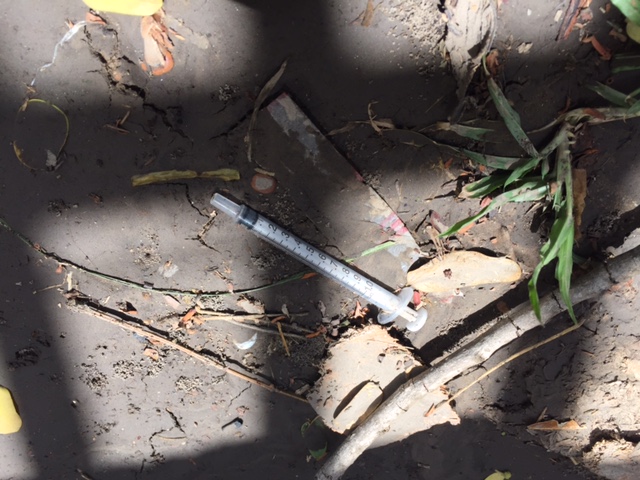Outside the gates of Khmer-Soviet Friendship Hospital, where the nation’s only licensed methadone provider is located, authorities rounded up drug users into a caged truck, a video from the scene on Monday shows.
About seven people were arrested for sleeping on the street and using drugs, the district security guard chief said on Tuesday. The arrests outside the Phnom Penh public hospital have now left some users of methadone, a heroin substitute used to treat addiction, fearful they also could be arrested, according to an NGO and drug users sitting outside the Center for Mental Health and Drug Dependence, the hospital’s methadone clinic, on Tuesday morning.

“It’s not fair. It’s not right, because they just come to get treatment. Why do they get arrested?” asked Put Sopheap, 29, who said he was a crystal methamphetamine user who kicked his heroin habit after he started receiving a daily dose of liquid methadone at the clinic about two years ago. Mr. Sopheap said he was now also worried about being detained.
Video footage of the arrests posted online shows people—a few of them holding babies—outside the hospital and inside a caged truck branded with the Social Affairs Ministry’s insignia. One man attempts to exit the cage and is grabbed by guards and punched before eventually being pushed back inside.
Taing Phoeuk, executive director of NGO Korsang, which refers drug users to the clinic, posted the video on Facebook on Monday, writing, “These are KORSANG MMT [methadone maintenance treatment] clients who are getting daily dose at the Khmer and Soviet Friendship Hospital being arrested by the police this morning.”
Seven of Korsang’s clients who receive methadone were arrested in the crackdown, Mr. Phoeuk said on Monday. “Some of them were sleeping on the street,” he said.
Six other methadone users, who feared being arrested on their way out of the hospital, left through a back exit and traveled to Korsang’s drop-in center together, where they stayed most of the day, Mr. Phoeuk said.
“They were actually scared,” he said. “So they came and told us” what happened.
Sorn Sophal, director of the municipal social affairs department, declined to comment on Tuesday and referred questions to district authorities.
Ev Thavy, chief of the Chamkar Mon district guards, said his forces arrested six or seven homeless drug users in front of the hospital on Monday at about 7:30 a.m., among 27 detained in the district that day and handed over to the social affairs department.
“We arrested them because those people sleep on the sidewalk,” he said. “They cause instability at night time that impacts public security.”
District guards arrest homeless drug users two or three times per month, and detain people found in front of the hospital about once every two to three months, he said.
Sok Srey Moa, 34, said she had relapsed into using heroin after a two-month detention at Phnom Penh’s Prey Speu detention center about a year ago.
“After I left from the center, I became a scavenger and started using drugs again,” she said on Tuesday while sitting on the methadone clinic steps.
She said two of her friends were arrested outside the hospital after receiving methadone.
“I’m afraid,” Ms. Srey Moa said. “I worry that when I leave I’ll be arrested too.”
Sou Sochenda, a manager at Khana, an NGO that supports voluntary drug treatment programs, said there was a drug “hotspot” near the hospital, but arresting methadone users was not the way to support recovery.
“Arresting clients of methadone services has a direct impact on the lives of those arrested. These are people actively engaging in drug treatment who are trying to make progress in their lives,” Ms. Sochenda said in an email.
“Arrest and detention disrupts their engagement in treatment and as they will forcibly be detoxed there is a very high chance of relapse on release,” she said.
“People on methadone are 16 times less likely to overdose than people on heroin so…[being arrested] potentially puts people’s lives at risk.”
Along the hospital’s walls lining Street 271 in Chamkar Mon district, at least 30 used needle syringes and other drug paraphernalia were clearly visible.
Pin Sokhom, drug program manager at NGO Mith Samlanh, which along with Korsang operates the country’s only needle-exchange programs, said on Tuesday that the organization doesn’t provide clean syringes inside the methadone clinic itself.
“But outside the hospital, if they are still injecting drugs, we still provide clean needle syringes,” Mr. Sokhom said.
Mith Samlanh encourages drug users to return used syringes to them in order to discourage the sharing and reuse of needles, he said.